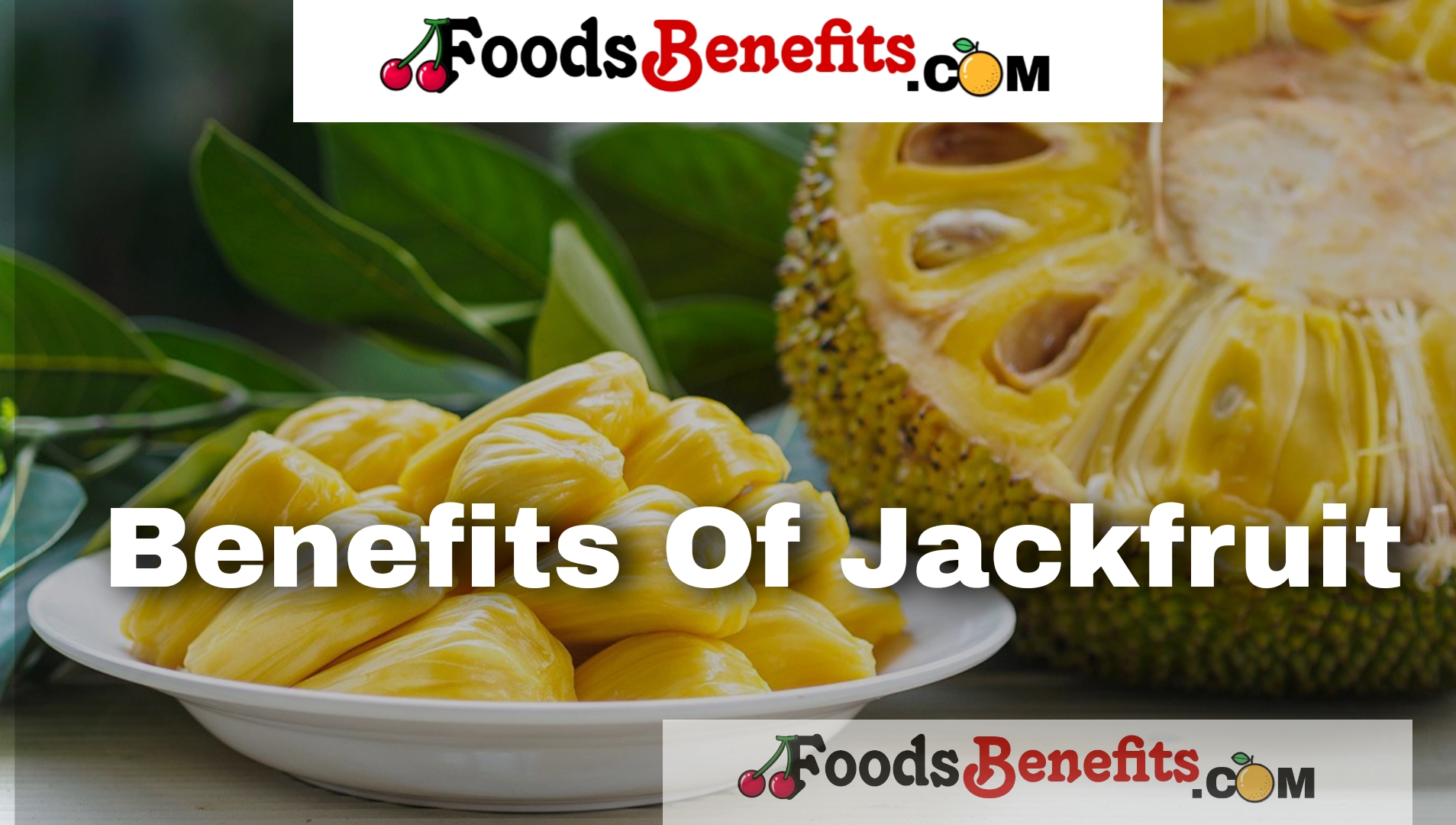Jackfruit: The Giant Tropical Fruit Packed with Nutrition and Flavor. Benefits Of Jackfruit
The jackfruit, the world’s largest fruit that grows on trees, is gaining popularity due to its nutritional value and adaptability. Its formal name is Artocarpus heterophyllus, and it is native to Southeast Asia, grown in countries such as Bangladesh, India, Indonesia, and Thailand. Jackfruit has a unique flavor and texture that make it suitable for a wide range of culinary applications, whether it is eaten ripe or unripe. In addition to its culinary uses, jackfruit is also praised for its abundance of nutrients and potential health benefits.
This article will cover the history, characteristics, nutritional value, health benefits, and culinary uses of jackfruit, as well as its increasing popularity as a plant-based meat alternative.
The Origin and History of Jackfruit. Benefits Of Jackfruit
The jackfruit has a long and rich history dating back thousands of years. It is believed to have originated in the rainforests of the Western Ghats of India and has been a staple food for local communities for centuries. It is also widely grown in tropical regions, especially in Southeast Asia, Africa, and South America. The fruit was revered for its ability to provide sustenance to large populations due to its enormous size and high yield.

In traditional Indian culture, jackfruit is often considered a symbol of abundance and prosperity. It is mentioned in ancient texts like the Ramayana and Mahabharata, further highlighting its significance in the region’s history and folklore. Over the years, jackfruit has spread across various parts of the globe, gaining recognition for its culinary and medicinal uses.
Read : Health Benefits of Banana
Botanical Characteristics of Jackfruit
Evergreen jackfruit trees grow rapidly and can reach heights of up to 80 feet (25 meters). They can thrive in various soil types and are highly tolerant of tropical temperatures, although they prefer loamy, well-drained soils. The tree produces massive fruits weighing anywhere from 10 to 100 pounds (4.5 to 45 kilograms), with some reaching weights of over 120 pounds (54 kilograms).
The jackfruit has a thick, greenish-yellow, spiky skin covering its exterior. When ripe, the fruit emits a strong, sweet scent that has been likened to a combination of mango, pineapple, and banana. The fruit consists of large, fibrous “bulbs” or pods covered in a sticky sap. The edible portion of the jackfruit is found in these pods.
Nutritional Profile of Jackfruit
Jackfruit is well-known for its size, versatility, and impressive nutritional value. It is a rich source of essential vitamins, minerals, and antioxidants that promote overall health and well-being. Here’s a breakdown of the key nutrients found in jackfruit:
- Carbohydrates: Jackfruit is high in carbohydrates, providing a quick source of energy. However, it is considered a low-glycemic food, meaning it does not cause rapid spikes in blood sugar levels.
- Fiber: Jackfruit is an excellent source of dietary fiber, which aids in digestion, promotes satiety, and helps regulate blood sugar levels.
- Protein: While not particularly high in protein compared to legumes or meat, jackfruit contains more protein than most other fruits, making it a valuable component of plant-based diets.
- Vitamins: Jackfruit is rich in vitamin C, which supports immune function, skin health, and wound healing. It also contains vitamins A, B6, niacin, riboflavin, and folate, which play essential roles in various bodily functions.
- Minerals: Jackfruit is a good source of potassium, which helps regulate blood pressure and supports heart health. It also provides magnesium, calcium, iron, and manganese.
- Antioxidants: The fruit contains powerful antioxidants such as carotenoids, flavonoids, and polyphenols, which protect the body against oxidative stress and inflammation.
Per 100 grams of ripe jackfruit, you get approximately:
– Calories: 95
– Protein: 1.5 grams
– Carbohydrates: 23 grams
– Fiber: 1.5 grams
– Fat: 0.3 grams
– Vitamin C: 13.7 mg (22% of the recommended daily intake)
– Potassium: 448 mg (10% of the recommended daily intake)
Health Benefits of Jackfruit
Due to its rich nutritional profile, jackfruit offers a range of potential health benefits, including:
- Promoting Digestive Health:
Jackfruit is packed with dietary fiber, which helps regulate bowel movements and prevent constipation. The fiber also acts as a prebiotic, feeding the beneficial bacteria in the gut and promoting a healthy digestive system.
- Supporting Immune Function:
The high vitamin C content in jackfruit boosts the immune system by encouraging the production of white blood cells, which are essential for fighting infections. The antioxidants present in the fruit also help neutralize free radicals that can weaken immune function.
- Improving Heart Health:
The potassium in jackfruit plays a critical role in maintaining healthy blood pressure levels by balancing sodium levels in the body. This can help reduce the risk of cardiovascular diseases such as hypertension, stroke, and heart attacks.
- Aiding in Blood Sugar Control:
Despite its carbohydrate content, jackfruit has a relatively low glycemic index, meaning it has a minimal impact on blood sugar levels when consumed in moderation. The fiber content further helps slow the absorption of sugar into the bloodstream, making it suitable for individuals with diabetes or those looking to manage their blood sugar levels.
- Enhancing Skin Health:
Vitamin C in jackfruit contributes to the production of collagen, a protein that helps maintain skin elasticity and firmness. Regular consumption of jackfruit can promote healthy, glowing skin and may reduce the appearance of wrinkles and fine lines.
- Possibly Helping Prevent Cancer:
The antioxidants, phytonutrients, and flavonoids present in jackfruit have been shown to have anti-cancer properties. These compounds help neutralize free radicals that can damage cells and lead to the development of cancerous cells. Additionally, jackfruit seeds contain compounds that may inhibit the growth of certain cancer cells.
Culinary Uses of Jackfruit
Jackfruit is incredibly versatile and can be used in a wide range of culinary applications. Its flavor and texture change depending on whether it is consumed ripe or unripe, allowing it to be used in both sweet and savory dishes.
Unripe Jackfruit as a Meat Substitute
One of the most popular uses of unripe jackfruit is as a plant-based meat substitute. Its fibrous texture resembles pulled pork or shredded chicken, making it a popular ingredient in vegan and vegetarian dishes. Unripe jackfruit has a neutral flavor that absorbs the spices and seasonings it is cooked with, making it a perfect canvas for various dishes like:
- Jackfruit Tacos: Shredded unripe jackfruit sautéed with spices and served in tacos with fresh vegetables and salsa.
- Jackfruit Curry: A rich, flavorful curry made with chunks of unripe jackfruit simmered in a spiced coconut or tomato-based sauce.
- Pulled Jackfruit Sandwiches: Unripe jackfruit cooked in barbecue sauce and served on a bun, mimicking the texture and taste of pulled pork.
Ripe Jackfruit in Sweet Dishes
When ripe, jackfruit has a sweet, tropical flavor that makes it perfect for desserts and snacks. Some popular uses of ripe jackfruit include:
- Jackfruit Smoothies: Blending ripe jackfruit with coconut milk or yogurt for a tropical smoothie.
- Jackfruit Ice Cream: Pureeing ripe jackfruit and mixing it into ice cream or frozen yogurt for a unique and refreshing treat.
- Jackfruit Chips: Thin slices of ripe jackfruit dried or fried into crispy, sweet chips.

Benefits Of Jackfruit Seeds: A Hidden Gem
Most people only eat the flesh of the jackfruit, but the seeds are also delicious and full of nutrients. Jackfruit seeds are high in fiber, protein, and important minerals such as potassium and iron. They can be ground into flour, cooked, or roasted and used in a variety of cuisines.
Jackfruit seeds can be used in curries, soups, and stews to provide texture and nutrients. Traditionally, they are cooked and offered as a snack. Their subtle nutty flavor goes well with both savory and sweet foods.
Read : Benefits Of Peanuts
Sustainability and Environmental Impact
In addition to its nutritional benefits, jackfruit is considered an environmentally friendly crop. It is a hardy plant that requires minimal care and can thrive in tropical climates without the need for extensive irrigation or chemical fertilizers. Its ability to grow in poor soil conditions makes it a valuable crop in regions prone to food insecurity.
Moreover, because jackfruit can grow to such a large size, it produces a significant amount of food per tree, reducing the need for large amounts of land and water resources. This makes it a sustainable alternative to more resource-intensive crops, particularly as the demand for plant-based foods continues to rise.
Conclusion: Jackfruit Benefits
Jackfruit is more than just a tropical fruit; it is a nutritional powerhouse with a myriad of health benefits and culinary uses. From its origins in Southeast Asia to its increasing popularity as a meat substitute in vegan and vegetarian diets, jackfruit has made its mark on global cuisine. Rich in vitamins, minerals, and antioxidants, it offers a range of health benefits.

